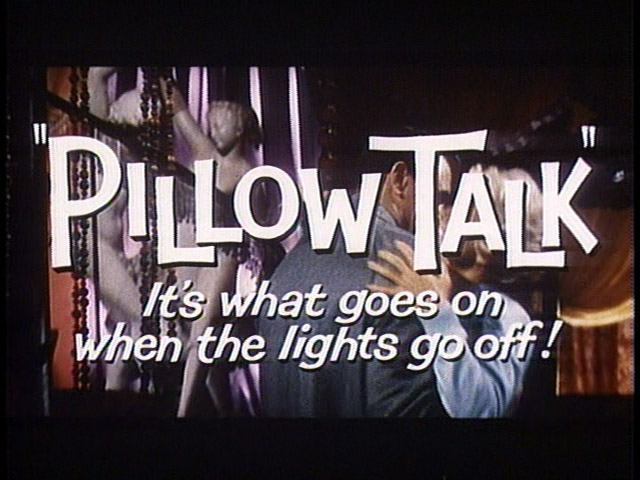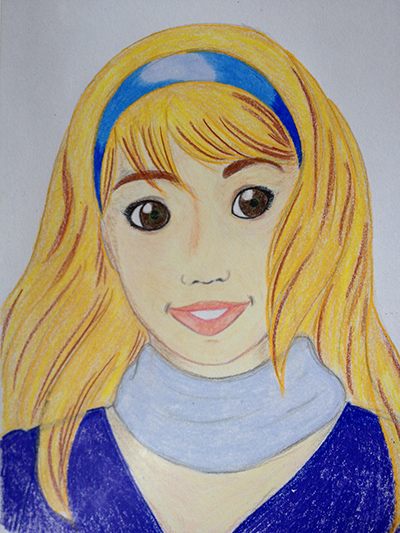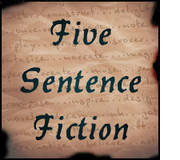by Mayumi-H | Nov 26, 2012 | Excerpts, Fearless, Process
Breathless, sweaty, and dizzy of a sudden, Ross tumbled to the bed beside her, one arm still draped loosely around her. They would need to clean up and wash before bed, but, for the moment, he just wanted to lie with her in the drowsy quiet. So, settling his head next to hers, he blinked, and swallowed, and asked:
“Can we cuddle a bit?”
No mincing words, here: I think sex is an important part of any adult, loving relationship. It’s fun to write, too…though what’s more interesting is examining what happens around the main act. Pillow talk in these situations can offer a unique perspective on your character.

Trailer title from the 1959 movie; public domain image.
Lovers (and this includes men, here) are often much more honest with each other when they’re naked and relaxed, coming down from a sexual high. Just something about that situation, I guess, that opens people up. 😉
If you’re so inclined to write a sex scene, I’d suggest at least considering that opportunity of after-sex pillow talk, to broach some of your more sensitive topics. Perhaps your woman has body image issues, or your man has trouble with intimacy. You can potentially use this time to explore those, in a natural, conversational way.
Because honest communication is what truly makes sex sexy.
If you write sex, on what part do you like to focus: the buildup, the climax, or the denouement? If your story doesn’t include the convention of sex, how do you approach sensitive relationship subjects?
by Mayumi-H | Nov 17, 2012 | Fearless, Process, Short Stories

Though currently embroiled in my NaNoWriMo tale of soldiers and stowaways, I was abruptly struck by Julia’s prompt for this week’s 100-Word Challenge for Grown-Ups:
…the silence was deafening…
WordPress and Twitter friends itsjennythewren and sjbwriting said I should feel free to indulge my pestering inner muse on this one, though, so I’ve done. (Make sure to check out their blogs, too!)
If you don’t like my story, that’s fine. Sometimes, we just have to write for ourselves.
“It should have stayed that way”
The blaring horns, the cawing gulls, even the roar of rolling waves…none of them matched the sounds of Ross’s heartbreak: hitching breaths exploding like dynamite, staccato bursts of emotion spit wet and raw between his teeth.
Yet, still, he was beautiful.
And that beauty pulled, like an undertow, until his sobs became a muffled gasp of surprise from around the briny clasp of his lips.
A heartbeat later, he pulled away, his eyes clear and full. Not of love, though. And even the practised platitudes couldn’t make vanish that look of betrayal.
Wordlessly, he rose, and left. And for Neville, the silence was deafening.
I feel a bit bad that my WordPress readers only get to see this tortured side of poor Neville, when he’s really one of my more well-balanced characters. Love grows in different ways for each of us, though, and this love between him and Ross is integral to the depth of their friendship.

“Good old Nev.”
Others might say I’m pandering with my portrayal of Neville, because his sexual orientation gives no conflict to the main plot. But I always felt that, even if there’s no sexual affair between them, his love for Ross made him more honest than virtually any other character in the story. The story (and Ross) needs that. I don’t think I could make Neville straight and have him be the same character or give his perspective equal weight than it has with him being gay…and still a little bit in love with Ross.
How did you answer this week’s prompt? And/Or: What are your feelings about a character’s identity affecting (or not affecting) the plot of a story?
by Mayumi-H | Nov 3, 2012 | Fearless, Process
When you look at yourself in the mirror, what do you see? Take a moment, and think about how you’d describe yourself. If I were going for strict facts, I’d say I’m an Asian female, five-foot-one, brown eyes, dark hair, slight build, no visible distinguishing marks. That sounds a bit boring, doesn’t it? But, describing me as “a quirky techie with a rippling laugh and lopsided smile” doesn’t exactly help in forming a physical image for a reader’s eye.
The first physical description I have for my (current) MC comes about 3000 words in [first draft], and it only consists of him “[running] his fingers through his jagged, shower-damp hair [and checking] the closeness of his shave.” Aside from that, I wanted to let the characters speak for me: a local girl giggles at his attention, his best friend describes him as “a vain bastard bordering on narcissistic”, and the love interest calls him “the finest thing [she’d] ever seen.” He’s a surfer and a runner, so he’s got an athletic build, and he looks down at people a lot, so he’s tall (and something of a jerk, but that’s not relevant to this post).
Conversely, the MC describes the woman he loves in all kinds of detail, most of it physical and visual.

I admit, I’m a little bit in love with Amber, myself.
Some folks say the mirror is an overused (bad) convention and shouldn’t be used for describing your main character. But what’s a good middle ground between overused and imprecise? What conventions do you use to describe your MC?
by Mayumi-H | Oct 22, 2012 | Fearless, Short Stories
 I’m returning to Julia’s 100-Word Challenge for Grown-Ups this week, where the prompt is:
I’m returning to Julia’s 100-Word Challenge for Grown-Ups this week, where the prompt is:
“…it can’t be that time…”
For those of you unfamiliar with this challenge, we’re to write a 100-word story using Julia’s prompt (in this particular case, we’re allowed to go to 105 words, since we have to incorporate the specific prompt phrase). Here’s mine:
“Let Go”
Tears came, despite her willing, and a rough scratching stifled the words from her throat:
“It can’t be that time,” she told him, as her hand hovered above the faint stubble of his cheek. How round it used to be, how full, when tickled laughter had been his only language. No longer, though: his face had grown so long, so narrow, like the rest of him, the very reflection of his father long past.
Now, she had to let him go, too.
She sniffed. “I’m not ready to say goodbye!”
A quiet sigh escaped him. Then, he chuckled. “Mum, I’m going to miss the bus…!”
I recently read a post over at Itsjennythewren’s blog about researching publishers. One point Jenny mentioned was that each character should “feel like they are the main focus in the book.” I have quite a few characters to deal with, so I don’t know how successful I’ve done at that bit. But, I do like thinking about each character’s life, no matter how little page time that character might get. Hopefully, this little vignette – about Maggie, Ross’s mum – manages her perspective successfully.
What did time take away from your characters, this week?
by Mayumi-H | Oct 15, 2012 | Fearless, Process
I’m back from Japan, where I had a lovely time with both my intimate and my extended family. We ate, drank, walked the touristy route I always walk whenever I visit (the mountain trails at Arashiyama; the shopping maze at Kawaramachi dori; the delectable tempura at Yoshikawa Inn), as well as our usual visits to friends in Tsu (where, this year, we saw the Ama divers at Toba) and Sanda (where we always get treated to the most scrumptious home barbecue). While I did all this, though, in the back of my mind, I was still thinking about the men and women of Fearless.
The story takes place mostly in the fictional village of Harbram, based loosely on lovely Porthtowan, along the north Cornwall coast, where I have extended family on the other side. It’s more than a stone’s throw from Kyoto, of course, but the principles of writing it are the same ones I took for writing characters in Japan.

The cliffs at Porthtowan, inspiration for Harbram
First, there’s nothing quite like immersing yourself in the culture of your characters, especially your main character. Not everyone can indulge in a two-week vacation in their MC’s culture or experience it firsthand, but there are ways around that. Read up on your subject: history, lifestyle, idiosyncrasies; the Internet is a bountiful and endless source of information about this sort of thing (also many times erroneous, so do be certain to double-check your resources). Talk to people who live the lives of your characters, in experience, background, even outlook. With so much programming out there, it’s likely you can even find some television shows or movies about your subject! (Be mindful of artistic license with this one, though.)
All this is to say, you don’t have to rely solely on your imagination to create the world in which your characters live. Many times, you shouldn’t rely only on your own brain, because you will probably be missing out on a lot of important facts or details that can end up making or breaking your story. (I cringe every time I read a story set in Japan where characters do not take off their shoes before entering the house!)
There’s a lot of information available at your fingertips. Use it to build a full, lush, beautiful world in which your characters will play, dream, cry, and live.

Porthtowan’s Mount Hawke footpath, the inspiration for my Crow’s Point path.
What techniques do you use to create your characters’ world?
by Mayumi-H | Oct 1, 2012 | Fearless, Short Stories

Contributed to the Five Sentence Fiction prompt DEVOTION, from Lillie McFerrin’s blog.
My Fearless story may be about Ross and Amber, but their supporting cast is just as important. In some ways, I think supporting casts offer some of the real meat of a story. They can provide back story where necessary; they can offer contrasting views of a situation; they can help create necessary conflict – or resolution – for or between the main characters.
Neville is, without a doubt, my favorite of the Fearless supporting characters, but I’ve enjoyed creating the back stories for the others, as well….
“Onward”
She loved this tiny village by the sea, with its cool, breezy nights and crisp, sunny days; she loved the way her husband had stories to go with its every old name and hidden corner, and the way her daughter was making stories of her own, to go with every new face and open break of beach and field.
But, as much as she loved the odd eccentrics and familiar friends of this village, she loved more who she was, the purpose she knew she had. Which was why it almost broke her heart to broach the subject she’d kept secret for too long, and told her husband she had to move on, to where she could do the most good, away from here.
He paused for but a moment. Then, as though he’d only been waiting for this, he smiled, and said, “So, when do we leave?”
Which of your supporting characters do you love – or hate? Why?









Recent Comments